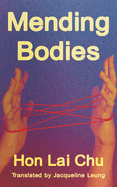
If walking in someone else's shoes is meant to encourage empathy, Hong Kong writer Hon Lai Chu exaggerates the adage, medically conjoining bodies in her disturbingly consuming dystopic novel, Mending Bodies. Writer Jacqueline Leung, also from Hong Kong, seamlessly enables English access in her first full-length translation.
The recent Conjoinment Act legislates how individuals are to merge their bodies into surgically bound pairs. A psychologist encourages conjoinment as the antidote to society's "state of crisis": "The obsolete institution of marriage, racial conflict, wealth discrepancy, the many contrived wars--they all came from our inability to fill the existential lack we were born with as individuals." Only by being stitched together is "true fulfillment" possible. Environmentalists are also supportive: "A conjoined couple will shower, eat, and travel together, consuming less gas and water than if they were single." The unnamed narrator, focusing on conjoinment as her dissertation topic, considers multiple ways of being--alone, with a roommate, with family, as a conjoined couple. What she eventually decides for her own future will engender irreversible consequences.
Hon's strange and creepy tale is infused with plenty of body horror--and, perhaps, unintentionally absurd logistics (how might two bodies attached at the chest use a toilet?). Her sparse writing suggests more than it reveals on the page, cleverly encouraging extraneous imaginative scenarios. Interwoven with the narrator's existential queries and dilemmas are excerpts from her dissertation-in-progress, with sources and subjects so convincing as to require Google breaks between chapters; the "case studies" prove particularly provocative. Mending Bodies deftly challenges the future of individual autonomy. --Terry Hong

